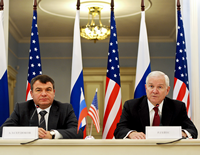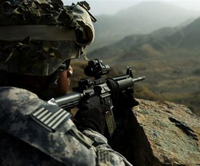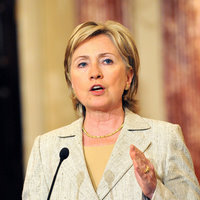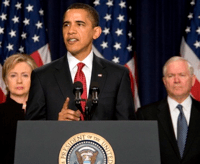A number of attempts to create alternatives to the U.S. Global Positioning System are underway. Russia is close to completing its GLONASS system, which India plans to join, while China is working on developing its own system. In an email interview, Charles Vick, senior technical and policy analyst for GlobalSecurity.org, discussed global satellite navigation systems. WPR: What countries are currently pursuing a global navigation satellite system (GNSS) capability and what is the status of their programs? Charles Vick: The Global Positioning System (GPS), the global navigation system developed by the U.S., remains the primary system used by both the military […]
Defense & Security Archive
Free Newsletter

Robert Gates has just completed his first and perhaps his last trip to Russia as secretary of defense under President Barack Obama. Although the two-day visit produced little of substance, some of Gates’ public reflections help us understand how much the Russian-U.S. military relationship has improved during the last few years. As expected, much of the media coverage concerned Russia’s response to the military intervention in Libya led by the U.S., Britain and France. The apparent split between Prime Minister Vladimir Putin, who denounced the intervention as a “crusade,” and President Dmitry Medvedev, who mildly rebuked his erstwhile boss, attracted […]
Six people were reportedly killed and dozens more wounded when security forces opened fire on protesters in Syria. Residents say the violence occurred at the Omari mosque in the south city of Deraa, which has been the focal point of a string of small but unprecedented rallies calling for the end of the ruling Assad regime.

The military operation that the U.S., the U.K. and France have launched against Libyan leader Moammar Gadhafi thus far lacks a clear set of strategic goals. The coalition partners cannot agree regarding whether the operation is intended to remove Gadhafi, to support rebel operations against Gadhafi loyalists or simply to protect civilians from attack by Gadhafi’s military forces. The lack of a strong, well-defined set of strategic objectives means that military operations in and over Libya are likely to be incoherent. All this is bad enough, but perhaps worse is that there is little indication that France, the U.K. or […]
Recent events in Libya have refocused attention on Libya’s remaining chemical agents, with particular concern over the possibility that Moammar Gadhafi will use them against the Libyan insurgents or against other targets, such as Western civilians. But there are also fears that the Libyan government could somehow lose control of some of the agents, whether due to ongoing domestic chaos or an eventual collapse of the regime, allowing terrorists to acquire them. Leaders of the coalition currently enforcing the U.N.-mandated no-fly zone over Libya need to adopt a strong declaratory policy against any misuse of these agents, even while they […]

As an Army brat who grew up traveling the world, I’ve witnessed first-hand both the power and sense of hope that the United States projects around the globe. These qualities stem from both the might of our military as well as the less tangible characteristics of our diplomatic and compassionate efforts. In decades past, the roles of the State Department and Defense Department were often considered to be parallel and discrete. State negotiated treaties and engaged in diplomatic and aid missions around the globe, whereas Defense was brought to bear when words failed to suffice. Despite being complementary, these elements […]
Greg Scoblete responded to my argument in support of a military intervention in Libya, which he aptly dubbed the “Because We Can” standard, by questioning just what it is we think we can do: It’s important to recognize that intervening in Libya and bombing Gaddafi’s supporters is not the same thing as finding a politically acceptable end-state to the country’s rebellion — a fact that is being resolutely overlooked by most of the campaign’s supporters. So, yes, there are very low barriers to entry in Libya, which makes it attractive where a campaign against Bahrain or Burma is much less […]

One of the most revealing features of today’s international system is that only two nations, America and China, possess sufficient power to truly disrupt it — either directly, through the application of military force, or indirectly, by unleashing an uncontainable economic crisis. In fact, to truly derail globalization in its current trajectory, the two would need to act in concert, either by fighting each other directly or experiencing simultaneous economic collapses. Short of those two scenarios, modern globalization remains highly resilient to shocks of all sorts. That resilience is the only power that really matters in this world. It defines […]

For many years, the United States has been the world’s most powerful nation. It remains the undisputed global leader in military power and still possesses vast economic and cultural influence. And while Washington’s ability to combine both hard and soft power to influence world events — what Joseph Nye calls “smart power” — has diminished somewhat, it is still in a far superior position relative to any other country. U.S. primacy, however, comes with opportunity costs. An alternate path might have delivered a comparable level of security at far less expense and risk. Even many who unabashedly celebrate our 20-year […]

The diffusion of power in the 21st century from states to nonstate actors has left more and more things outside the control of even the most powerful states. To accomplish their goals, states must do better at leveraging their smart power, which combines the hard power of coercion and payment with the soft power of persuasion and attraction. Doing so will often require wielding power with others rather than over them. What will it mean to wield power in the global information age of the 21st century? What resources will produce power? In the 16th century, control of colonies and […]

The opening acts of the 21st century have fundamentally challenged long-held notions of military power. The past decade has unveiled not only the disruptive power of terrorist groups with global reach, but also the ability of low-budget insurgent groups to directly confront the best military forces of the West — with surprising success. Moreover, recent revolutionary events across the Arab world have demonstrated the limits of military power when facing mass popular uprisings. Disorder, chaos and violent extremism seem on course to replace state-on-state violence as the most common forms of conflict in the new century. Given this new security […]
I was invited to participate Friday on France 24’s panel discussion program, The World This Week. We focused primarily on Libya, where the actual initial air strikes had yet to occur, but the discussion holds up notwithstanding. Other guests included France 24’s own Nahida Nakad, the Sunday Telegraph’s Anne-Elisabeth Moutet and Bloomberg’s Craig Copetas. Part one is here. Part two is here. This is one of those rare times where I was able to coherently and effectively express everything on my mind, with no need for clarification or expansion. The only thing I’d add is that, while I have not […]
Senior military figures, diplomats and officials in Yemen are abandoning theirpresident of the last 32 years. Ali Abdullah Saleh’s government has been beseiged for weeks by protests in the capital Sanaa. On Friday, more than 50 were killed in a crackdown on the streets. BySunday, president Saleh had sacked all ofhis ministers.
Four separate assaults by rebel forces in Colombia have left at least 11 dead. Authorities say the FARC and ELN guerrilla groups are responsible. Three civilians were killed in a rebel attack on a town in the Colombian region of Norte de Santander on Friday. The human death toll in rebel attacks over the last 24 hours now stands at eleven.

For decades now, strategic experts have predicted that our world was on the verge of a break-out in nuclear proliferation that would see us grappling with two- or three-dozen nuclear powers. Indeed, the inexorable spread of nuclear weapons is the closest thing to an unassailable canon in the field of international relations, as one cannot possibly employ the term “nuclear proliferation” without preceding it with the modifier “increasing.” This unshakeable belief, wholly unsupported by any actual evidence, drives many Cold War-era “wise men” to argue that mutually assured destruction (MAD) and strategic deterrence in general are obsolete and therefore immoral […]
There are plenty of compelling arguments against the intervention in Libya. The fact that it takes place as President Barack Obama embarks on his first tour of Latin America highlights the way in which our disproportionate and outdated engagement in the Middle East distracts us strategically from what I consider to be more important priorities in our own hemisphere. The delay in taking action allowed for a broad if fragile multilateral mandate, but also probably reduced the likelihood that the intervention will be immediately decisive and thereby raised the risk of a drawn-out stalemate. I, for one, think we could […]
